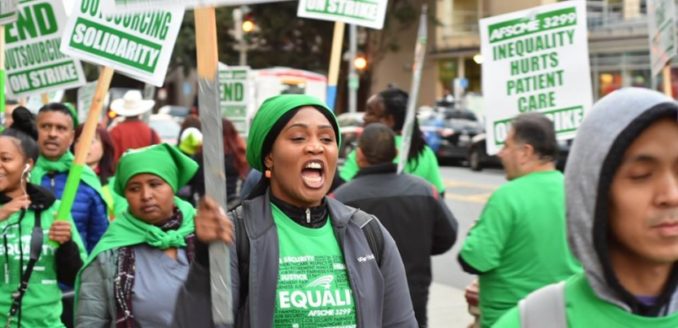On the picket line
UCal workers fight racism in contract struggle
A Nov. 10 Labor Notes article highlights egregious racist attacks on workers in Local 3299 of the American Federation of State, County and Municipal Employees at the University of California. UC is the third-largest employer in the state, and the 24,000-member local is its largest union, representing patient care and service workers across 10 campuses and five university hospitals. Its members are majority women, and 80 percent are women of color.
Inspired by the Black Lives Matter movement, Local 3299 set up the Racial Justice Working Group after signing their last contract in 2014. Using UC-supplied data, they discovered the system was following the corporate model. Top executives’ pay ballooned from 2005 to 2015, their positions filled mainly by white cis men. Meanwhile, the share of payroll going to the bottom 50 percent of women and workers of color fell, as more and more jobs were outsourced and fewer African Americans were hired when workers retired.
The RJWG met with members around the state who shared stories about pay differences, lack of promotion and decline in the African-American workforce. Due to outsourcing and hiring bias, the percentage of Black workers fell by 37 percent between 1996 and 2015. What members knew from experience — Black and Latinx workers earn on average 20 percent less than whites and are more likely to get fired or have management outsource their jobs — the union was able to show UC bias in two reports filled with analyses of racial and gender disparities.
They are now using the reports to craft bargaining demands including training and promoting existing staff and hiring more full-time workers from Black and Latinx communities. They propose “banning the box” — eliminating consideration of incarceration during hiring — and cutting ties with contractors linked to Immigration and Customs Enforcement; such UC contractors earned $280 million last year. They called a three-day strike in May (WW, May 17) when other unions struck in solidarity, and they joined unionized CU hospital workers in solidarity when they struck in October. (OTPL, Nov. 10) Local 3299 workers are now in contract mediation. Read the detailed story at tinyurl.com/ya8angh7/. Stay tuned.

Photo credit: AFSCME 3299
AFGE warns of rising racism against its members
In a searing statement on Nov. 8, American Federation of Government Employees National President J. David Cox Sr. encouraged workers to unite against the rising tide of racist attacks on government employees. The statement raises how AFGE workers are disgusted to witness racist and anti-Semitic attacks, especially on federal property. For example, at the U.S. Mint in Philadelphia, a racist hung a noose on a Black worker’s desk. In Washington, an executive director at the Department of Veterans Affairs’ Office of Small and Disadvantaged Business Utilization exhibited a portrait of KKK founder, slave trader and Confederate General Nathan Bedford Forrest. (tinyurl.com/ydbfwv2j) A vandal scribbled the “N word” on the National Park Service-owned African Burial Ground Monument in NYC. (WW, Nov. 14) These attacks aren’t all coming from anonymous haters: Interior Secretary Ryan Zinke told his workers that “diversity isn’t important,” and AFGE directors rightly called this out. (AFGE.org)
What the statement failed to raise, however, were actions of ICE, represented by the National Border Patrol Council, under the AFGE wing of Homeland Security. Nevertheless, it’s a good sign in the time of Trump’s racist hatred that unions recognize racism is a cardinal threat to unity and power in the labor movement.
Union solidarity helps win strike in St. Louis
Machinists Locals 777 and 313 in District 9 went on strike in mid-November. The 54 Machinists at Dave Sinclair Ford’s body shop in St. Louis struck to secure bonuses for service advisors and techs, who also wanted a guaranteed 40-hour workweek; both were sticking points in negotiations. The resulting three-year contract “was good for everyone,” said Machinists District 9 Directing Business Rep Mark Conner.
A critical factor in winning the strike was union solidarity, which sent a strong message to employers everywhere: Thirty members of Teamsters Local 618, who also work in the shop, honored the walkout without pay in solidarity with their fellow unionists. “When you have 30 guys that honor a picket and go without a paycheck, that gets [employers’] attention. It’s huge,” said Marvin Kropp, principal officer of Teamsters Local 618 and president of Teamsters Joint Council 13. (Labor Tribune, Nov. 26) Union solidarity forever!

